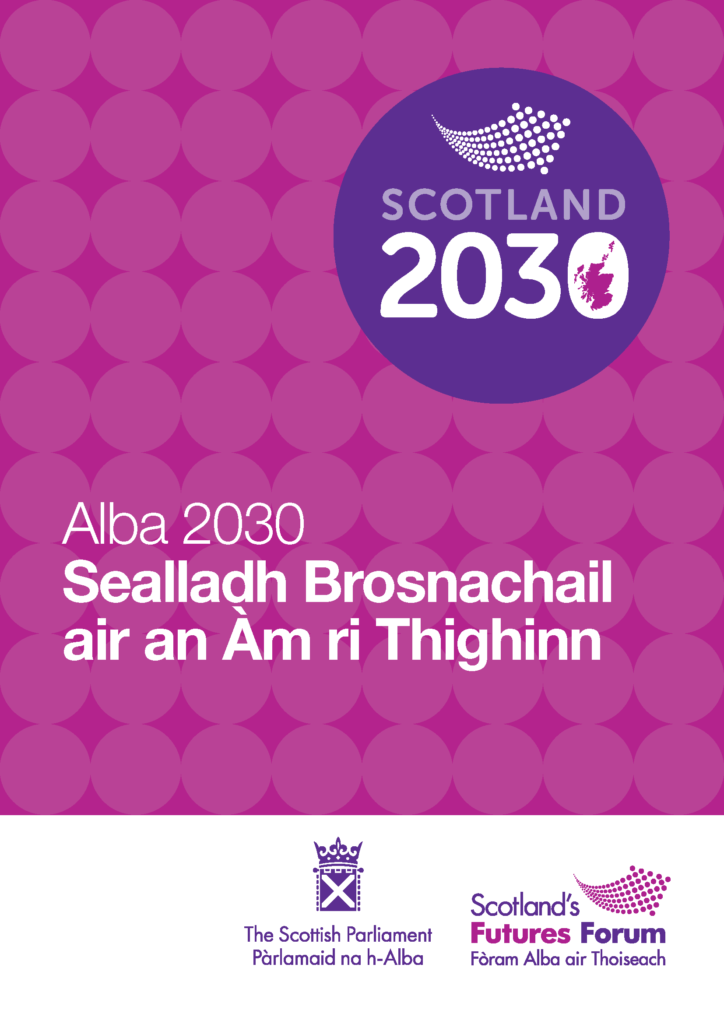Scotland’s Futures Forum, the Scottish Parliament’s think-tank, is today publishing the findings of its Scotland 2030 Programme, looking at what sort of country we might become, and what our response might be to the great changes of the next decade and beyond.
The work, which aims to help parliamentarians think about long term challenges, outside of electoral cycles and party politics, found that:
- Around half a million babies are due to be born in Scotland in the 2020s. To give every one of them the best chance in life, fundamental change is required to end child poverty – either through ‘pre-distribution’ or radical redistribution via taxation and spending.
- Technological disruptors such as Uber and Amazon will continue to have an impact on jobs and society. We need a school and lifelong education system that helps people adapt to changing circumstances, giving them the freedom to be creative, to take risks and, on occasion, to fail safely.
- To meet our ambitious targets of net zero carbon emissions by 2045, radical change is required in our working lives. There are clear pathways to a more sustainable future if Scotland switches investment towards sectors and industries that bring long-term benefits.
- Scotland need to make more progress on creating gender equal workplaces. Realities of life for women such as menstruation, pregnancy and menopause need to be taken more seriously by employers. Increasing the uptake of paternity leave will also help redress imbalances in the distribution of unpaid work
- Aging and death need to be addressed earlier in life. Most of us will become dependent on other people as we age. We need to tackle the taboo of discussing these things by normalising planning for this inevitability in our 40s and 50s, if we are to support the right care at the end of life.
The Futures Forum is also recommending 10 ideas for 2030 to be debated in the Scottish Parliament from the creative suggestions heard during its events. These include a Scottish island test site for autonomous vehicles, ‘digital havens’ with limited internet access – allowing visitors to switch off from their devices – and a Museum of Failure to show the role of failure in the path to achievement and encourage people to embrace risk.
Speaking on the report’s publication, Chair of the Futures Forum and Presiding Officer, the Rt Hon Ken Macintosh MSP, said:
“How we tackle the great issues of the next decade will shape Scotland for generations to come. Climate change, technological advancements and an ageing population all present profound challenges for the country, but also opportunity.
“This report highlights the importance of taking a positive view of the changes we’ll experience by 2030. As the response to the Covid-19 pandemic has shown, people can and do respond positively when life throws up huge challenges. But it has also shown the importance of including people in the process when the decisions on how to respond are made.
“A key part of the Futures Forum’s work, a central theme throughout this programme from all our events, and one of the founding principles on which the Parliament operates, is the importance of including everyone in discussions about our long-term future.
“How we move forward, harness new technologies, create more environmentally sustainable jobs and tackle child poverty are all topics ripe for debate as we look ahead.”
Reports
Most of all, we hope that it encourages everyone – Members of the Scottish Parliament and the people they serve – to take a positive view of our shared future.





